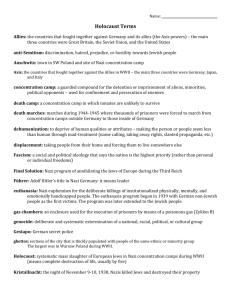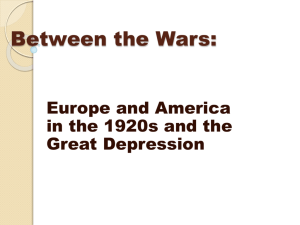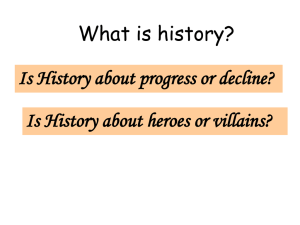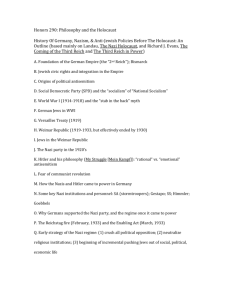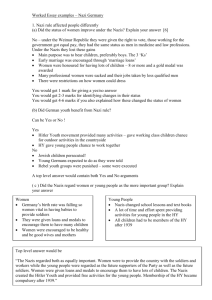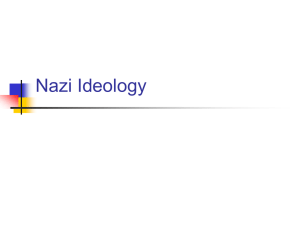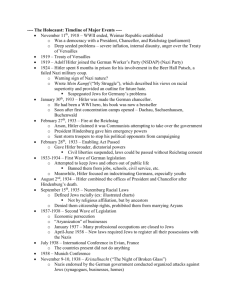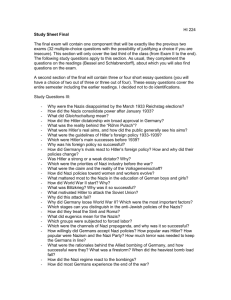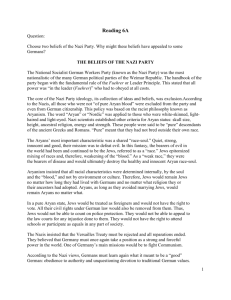IV. Developing Vocabulary in a Facing History Classroom
advertisement
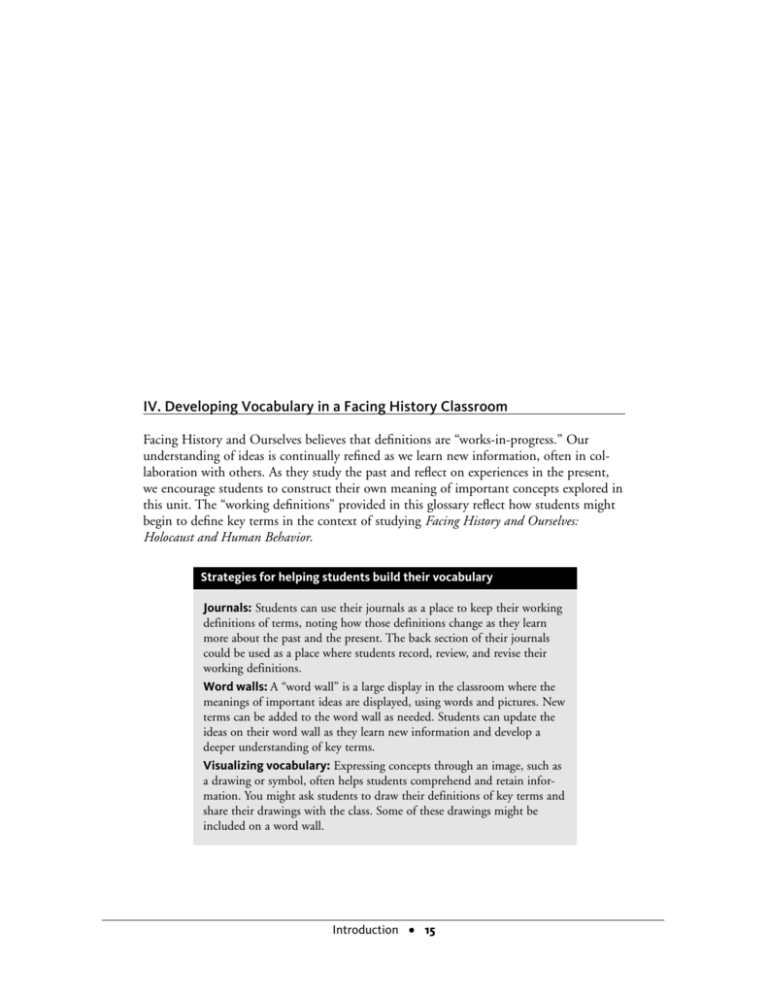
IV. Developing Vocabulary in a Facing History Classroom Facing History and Ourselves believes that definitions are “works-in-progress.” Our understanding of ideas is continually refined as we learn new information, often in collaboration with others. As they study the past and reflect on experiences in the present, we encourage students to construct their own meaning of important concepts explored in this unit. The “working definitions” provided in this glossary reflect how students might begin to define key terms in the context of studying Facing History and Ourselves: Holocaust and Human Behavior. Strategies for helping students build their vocabulary Journals: Students can use their journals as a place to keep their working definitions of terms, noting how those definitions change as they learn more about the past and the present. The back section of their journals could be used as a place where students record, review, and revise their working definitions. Word walls: A “word wall” is a large display in the classroom where the meanings of important ideas are displayed, using words and pictures. New terms can be added to the word wall as needed. Students can update the ideas on their word wall as they learn new information and develop a deeper understanding of key terms. Visualizing vocabulary: Expressing concepts through an image, such as a drawing or symbol, often helps students comprehend and retain information. You might ask students to draw their definitions of key terms and share their drawings with the class. Some of these drawings might be included on a word wall. Introduction • 15 Glossary of Key Terms Related to a Study of Facing History and Ourselves: Holocaust and Human Behavior aliens — immigrants who are not citizens allies — the nations fighting against the Germans during World War II, including the United States, the Soviet Union, and Britain antisemitism — hatred for Jews, often leading to discrimination against Jewish people Article 48 — a section of the Weimar Republic’s constitution that allowed the President to pass laws without the approval of the Reichstag (parliament) in times of crisis Aryans — a made-up race of Nordic people whom the Nazis said invaded India many centuries ago; the Nazis believed the Aryans were their direct ancestors and that Aryans are superior to people of other races atrocities — crimes audience — the person or people who receive a message Auschwitz — a town in what is now southwest Poland; site of the biggest Nazi concentration camp during World War II authority — the person or group of people in charge of a group, the leader belonging — being accepted, the feeling that you are part of a larger community blind obedience — obeying orders without thinking about consequences of these actions for yourself or others bully — a person or group that tries to intimidate and overpower someone else bureaucracy — the rules, structures, and regulations that control individuals’ work within an organization, typically a large organization like a government office bureaucrat — a person working for an organization whose job requires following orders and procedures bystanders — a person or a group of people who see unacceptable behavior but do nothing to stop it chancellor — leader of the Reichstag, the Weimar Republic’s parliament choosing to participate — the act of deciding to act in ways that benefit a larger community citizen — a person who is given special legal rights as a member of a nation civic education — the preparation of citizens, training people for their role as members of larger communities community — a group of people who share certain characteristics, such as proximity (they live close to each other), beliefs, or backgrounds concentration camps — places where “enemies of a state” are held against their will and often forced to do heavy labor. In 1933, the Nazis opened their first concentration camp for people who disagreed with their ideas. Later, during World War II, they sent millions of Jews and other victims, including gypsies and homosexuals, to concentration camps where most of them were killed, either by being murdered or as a result of horrible living conditions. conformity — when people act in the same ways and/or believe the same ideas as other people in their group in order to feel a sense of belonging consequences — the results of a person or group’s actions or behaviors constitution — a document which sets up the way a nation will govern itself contract — an agreement crimes against humanity — planned and organized murder or other inhumane acts committed against a group of people Introduction • 16 democracy — a form of government in which people have a voice in how they are governed, such as by voting in elections deportation — when a person or a group of people are removed, by force, from the place where they live depression — a time when many workers are unemployed. Companies make less money and some may close. As a result, workers lose their jobs. dictator — a person who has complete control of how a nation is governed dictatorship — a government ruled by a dictator discrimination — treating people differently, usually unfairly, because they belong to a particular group dissent — disagreeing with a person or a group of people emigration — moving from one’s native country in order to settle in another exclusion — when someone is not allowed membership in a group expectations/norms/rules — guidelines a group develops together and agrees to follow extermination — to kill on a large scale Facing History and Ourselves — a nonprofit organization that encourages students of many different backgrounds to look at racism, prejudice and antisemitism in order to promote the development of a more humane and informed citizenry fear — being scared of a person, place, thing, or idea Final Solution — the Nazi program of killing the Jews of Europe during World War II fragility — being delicate or fragile; easily broken genocide — acts committed with the intent to destroy an ethnic, racial, national, or religious group Gestapo — German police in Nazi Germany ghetto — during World War II in Europe, a section of a city in which all of the Jews were required to live head and heart — participating in an activity with both your mind (head) and your feelings (heart) Heinrich Himmler — one of the most powerful Nazi politicians. He was head of the Gestapo and also oversaw the Final Solution (the planned mass murder of Jews and others deemed unfit). President Paul von Hindenburg — President of the Weimar Republic (Germany) from 1925 to 1934. He appointed Hitler to the position of Chancellor of the Reichstag (parliament). historical context — the particular events, trends, and ideas that characterize a particular time and place Adolf Hitler — the Nazi dictator of Germany from 1933 to 1945 Holocaust — a period of 4 years (1941–1944) during which the Nazis organized and carried out the murder of six million Jews, as well as millions of others such as Jehovah’s Witnesses, Gypsies, and homosexuals identity — how a person answers the question, “Who am I?” often including their interests, beliefs, religion, family, ethnic background, etc. Identity is shaped by the individual and it is also influenced by society. ideology — a set of beliefs inclusion — when someone is allowed to join a particular group or community inflation — when money loses its value. During inflation, you need more money to buy the same item (e.g., $3 to buy milk that used to cost $2). intermarriage — marriage between people of two different backgrounds; in this case, marrying someone from a different religion, such as a Jew marrying a Protestant isolated — to be separated from the main group Introduction • 17 Jew — a person who is considered to be a member of the Jewish community because of a shared faith, history, or cultural background judgment — the act of evaluating behavior (in terms of right and wrong), deciding who is responsible for this behavior, and determining rewards or punishments justice — when one receives their deserved punishment or reward Kristallnacht — “the night of broken glass”; a night of organized street violence against Jews in Germany and Austria (November 9–10, 1938) mass murder — the widespread murder of a large number of people media — different methods of communication (such as TV, Internet, magazines, newspapers, etc.) that reach a wide audience membership — belonging to a group memorials — places to remember and honor special people or events message — an idea that a person or group tries to communicate to other messenger — someone or something that distributes a message Nazi — a member of the Nazi political party Nazi Party — (the National Socialist German Workers’ Party) a political group (party) founded in Germany in 1919. Its main leader was Adolf Hitler. The Nazi Party supported the idea that only people of Aryan decent should be citizens of Germany and that Jews, and others deemed unfit, should be removed from the country. Nuremberg laws — a set of laws passed by the Nazis in 1935. The laws classified people as German if all four of their grandparents were of “German blood,” while people were classified as Jews if they had three or four Jewish grandparents. A person with one or two Jewish grandparents was called a Mischling, a crossbreed. These laws were later used to decide who would be deported to ghettos and concentration camps. oath — a vow or promise obedience — following rules, orders or commands opportunism — taking advantage of a situation from which you might benefit without considering (or disregarding) the consequences for others ostracism — excluding a person or group from the larger community others — people we define as different and separate from us party platform — a document that lists the core beliefs of a political party peer pressure — the idea that you need to act in a certain way to maintain a friendship or be accepted in a social group; doing something or believing something just because that is what your friends are doing or believing perpetrators — those who commit crimes and other acts of injustice or violence persecution — being treated unfairly, often because of your beliefs or background political party — a group of people who share the same beliefs about how government should be run prejudice — to pre-judge a person because of a group to which that person belongs propaganda — information spread for the purpose of influencing opinions, often for or against a particular idea or group. To persuade an audience, propaganda often uses lies, misleading information, or appeals to emotions rather than reason. punishment — a penalty for bad or illegal behavior race — a classification of human beings based on the idea that people can be divided into separate genetic groups often based on skin tone. This classification is often used to support a false belief that some groups of people are genetically superior to other groups of people. reflection — the process of thinking deeply about an idea or event, often personal in nature (such as by thinking about your opinion or your experience with a topic) Reichsmark — the German money used during the Weimar and Nazi eras Introduction • 18 Reichstag — the German word for the building where laws are made, like our Capitol in Washington DC; also refers to the German legislature between 1871 and 1942 to which members were elected (until 1933), just as Americans elect members to Congress religion — a belief system based around spirituality and/or a divinity reparations — paying back those who suffered from a crime rescuers — people who attempt to save victims of violence resettlement — when people leave their homes (often under force) and move elsewhere resistance — questioning authority or fighting back against unjust treatment resisters — those who fight back against authority responsibility — one’s duty or obligation restitution — making things better after a crime or injury scapegoating — when a person or group is assigned blame for a larger problem or issue self-determination — the belief that every nation (or group of people) should have its own independent state and not be ruled by others stereotype — a generalization about an entire group of people; a belief that each member of a particular group possesses the same characteristic supremacy — to be (or deem oneself to be) above or superior to another person or group survivors — people who have lived through an experience of violence or injustice synagogue — a Jewish house of worship Treaty of Versailles — the peace treaty signed in 1919 that ended World War I and made clear Germany’s defeat. Germany was ordered to pay back the victors (primarily France, Britain, and Russia) with money and land. Many Germans felt this was unfair and humiliating. Universe of Responsibility — how we define whom we are responsible for helping and protecting upstander — an individual, group, or nation who witnesses injustice and take steps to stop or prevent it victims — people who have been abused and/or attacked, verbally and/or physically Weimar Republic — the regime in post–World War I Germany, from 1919 until 1934 when Adolf Hitler took power Introduction • 19


